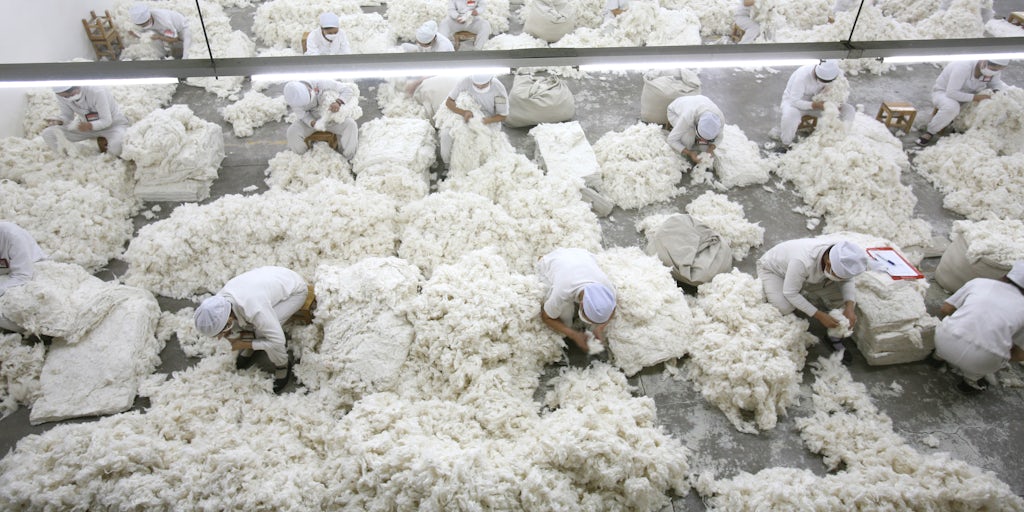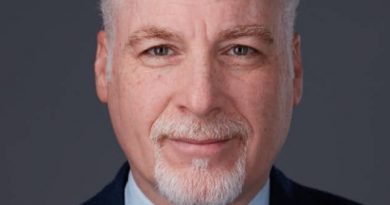Mayor Eric Adams Tells Fashion Designers to ‘Lean into the Pressure’ – WWD
“Fashion is New York and New York is fashion.”
With those words, New York City Mayor Eric Adams welcomed dozens of designers to the New York Fashion Week spring 2024 kickoff cocktail party at Gracie Mansion Thursday night. Dressing the part in a red made-to-measure blazer, white open-neck button-down shirt and black pants, he played to the crowd, telling attendees how he routinely changed his clothes several times a day to suit his mood and how he would only agree to walk in a fashion show in swimwear.
Talking up NYFW as “the most fashionable moment to be in this amazing city to enjoy all we have to offer and what fashion means to all of us,” Adams said, “I believe that this is the heart of fashion globally, the intersectionality of all of our cultures. The ways we do business and how we dress, how we look, how we think, is very much part of what makes the city great.”
It also steers tourists, shoppers and others into stores as well as ancillary businesses, hotels and restaurants to spend. In stronger years, NYFW generated a total economic impact of $887 million in 2015. The mayor veered away from the financial engine part of the equation, nor did he mention the city’s ongoing migrant crisis. Twenty-four hours earlier Adams claimed that the influx of 110,000 asylum seekers “will destroy the city.” Nearly 60,000 individuals, who have crossed the southern U.S. border, are now being housed in city shelters and emergency sites. Interestingly, immigrants have been an essential part of the city’s garment manufacturing since the early 1800s.
In his introductory remarks, CFDA president Thom Browne alluded to the asylum seekers’ situation, thanking Adams for taking the time despite his busy schedule and “especially with the challenges that are going on here in New York.”
In turn, Adams acknowledged that while succeeding in the fashion industry is not easy, designers make an indelible impact on the lives of those they dress. Illustrating how fashion can make people feel better about themselves, Adams noted how transformative clothing can be for a formerly bullied promgoer with a learning disability, or a domestic violence survivor. “It’s more than clothing. The piece of material that we place on our bodies is a way that we define ourselves. And when it’s done correctly, we feel good about ourselves. It gives us a level of confidence, it gives us a level of strength and courage.”
Although the economic picture may not be especially rosy right now, Adams encouraged the designers, retailers and executives to hang tough. “This fashion week let’s celebrate and rejoice. Let’s lean into the pressure of the moment, because I’m told that pressure produces diamonds.”
Stacey Bendet, Lauren Bush Lauren and David Lauren.
Matteo Prandoni/BFA.com
Browne delivered a similar message, encouraging his peers to always remain true to their mission and fight through the hard times. Quoting Billie Jean King, he said, “Pressure is a privilege. And I truly believe that it is a privilege to have the pressure that we put on ourselves each and every season with the collections and the stories that we tell, because we are the most vulnerable when we are really truly telling our stories in our own way. The most important thing this week is to really embrace that pressure and to enjoy the privilege of that pressure.”
Browne recalled retrieving his first collection from a Long Island City factory 20 years ago on an oppressively hot day via subway with his then one employee. He said, “It was a collection that nobody really liked, nobody really could fit in. Therefore, it wasn’t the best way to start a business.”
Having never abandoned his original vision, Browne has subsequently built a multimillion-dollar company by “fumbling through it. I just did it my own way. That’s what’s most important for all of us. Don’t care about what everybody else is doing, just truly tell your story in your own way. That is what people will respond to and that’s the key to success — along with hard work and a commitment to a more long-term approach.”
Earlier in the day, Browne was even more candid with CFDA members in an email that advised, “No one else can tell your story. Also, don’t care how many people will see it or appreciate it. Important work is never understood or appreciated by all. But the people that do are the right people. The only thing you should care about is loving your work more than anyone else and knowing that you have created something that has scared you a bit.”
Gabriela Hearst
Matteo Prandoni/BFA.com
That edict was something that many in the intergenerational crowd could relate to, whether that was relative newbie designers like the Tanner Fletcher duo, Bach Mai, Jacques Agbobly or Batsheva Hay, Carly Cushnie and Jackson Wiederhoeft, or more established ones like Vera Wang, Maria Cornejo, Kenneth Cole, Jeffrey Banks and Frederick Anderson. Consumer favorites like Gabriela Hearst, Rachel Comey and Stacey Bendet were on the scene. CFDA chief executive officer Steven Kolb also was there, as were retail executives like Linda Fargo, Roopal Patel and Rickie De Sole.
Rickie De Sole and Tracy Margolies
Matteo Prandoni/BFA.com
At 95, designer Stan Herman has seen his share of New York Fashion Weeks. Given the current shaky state of business, he said he wouldn’t want to be starting a company today. However, surveying Thursday night’s crowd of designers, he said, “But look at the wonder of all this. Everybody looks like they came from a different country. I remember a party like this 50 years ago — everybody looked alike.”
Given the unsteadiness of retail and many consumers’ ultracasual style, WWD asked attendees what’s needed to get more people shopping again. Here, a recap of their suggestions.
Linda Fargo, Kenneth Cole and Roopal Patel.
Matteo Prandoni/BFA.com
Stan Herman: “The public is more concerned about politics than fashion. People are very confused by the whole political situation. I’m on QVC and that’s where you get instant gratification. They’re fighting, they’re fighting their way. Every time you’re on you’re not sure what’s going to happen. I wouldn’t want to start a business today.”
Vera Wang: “Make it more money. I was just in Paris and London, and they’re mobbed at Dior, mobbed at Courrèges. At Dior, you have to wait on line to get in. We’re not raising our prices.”
Muge Dogan and Vera Wang
Matteo Prandoni/BFA.com
Jacques Agbobly: “The climate crisis is a huge part. Now people are coming out of a post-pandemic vibe so spending is a risk. They’re being conservative about what they’re buying, because we don’t know if another pandemic will happen. Time will push them over to spend. When I’m shopping, I want to be able to trust that it’s an investment. It takes time to figure out what to invest in. Spending money is an investment.”
Ralph Lauren’s chief branding and innovation officer David Lauren: “Every brand has to have something to say….We were showing tuxedos when everybody was home [during the pandemic shutdown]. We knew that once it ended, there would be pent-up demand. And it’s the same now. We’re creating excitement and thinking about where we will be in a few months. We’ve seen enough bumps in the road to know things will eventually get better. So invest when the chips are down — that’s when you win.”
Batsheva Hay: “People are generally not dressing up as much, right? Designers have been trying to accommodate people’s cozier lifestyle and have been trying to not make things as insane [as in the past] and try to produce on a level that is ‘fashion.’ Fantasy is going to get people to buy again, because we don’t need anything. We know that nothing is necessary and that we consume too much. The only reason to be a consumer any more is because you have to have something due to its emotional value.”
Kenneth Cole: “You have to transform their wardrobes. The most precious commodity in New York and everywhere today is closet space. You have to earn a space in their closet. If you’re going in, something’s got to come out. You have to have a point of difference and a reason to exist. Our current business is good and is getting better.”
Rebecca Minkoff: “Part of what we’re doing is partnering with Rakuten this season and you get 10 percent cash back. We’re launching an exclusive bag to coincide with our event Saturday, and that bag and the fall collection is available at 10 percent cash back for three days [Monday through Wednesday]. My customer, I don’t have to incentivize her, she’s shopping. Our orders are up. For us, the fourth quarter is our biggest season because it’s leather. You’re not buying leather in the summer. I’m always trying to find ways to thank our customer and make her feel great for being loyal. We wanted to do that for a short amount of time around fashion week.“
Tanner Fletcher’s Tanner Ritchie and Fletcher Kasell: “Fashion is so intimate. There are so many amazing designers out there that the customer can always connect with.”










